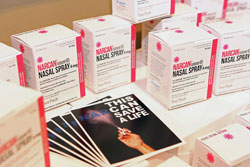Narcan, a drug that halts the effects of an opioid overdose, has been deployed by New Jersey emergency officials over 18,000 times since its widespread implementation in 2014, according to an article by NJ.com.
As of 2016, the drug has been deployed an average of 21.8 times per day; it is expected that it will have been utilized nearly 8,000 times by the year’s end, according to the NJ.com article. Data on opioid and heroin abuse in the state is difficult to pin down, but the use of Narcan by first responders in the field provides one of the clearest indications of how widespread it is.
Narcan, also known as Naloxone, is usually administered as a nasal spray. The drug, used in the case of opioid overdose, immediately blocks opioid receptors in the brain, allowing someone to recover in seconds, even if they aren’t breathing. While the figures are not exact – in some cases, Narcan is deployed multiple times per patient, and the data does not include information from hospitals – but it does show how emergency officials constantly respond to a flood of patients who are suspected to be suffering from a heroin or opioid overdose.
“The Monmouth and Ocean County area has a large heroin problem,” said William McElrath, Chief of the Monmouth University Police Department (MUPD). “Although we do not see the typical signs of heroin abuse [on campus], it would be naïve to think that Monmouth University is not impacted. Based on the overdose and arrest rates in surrounding towns, there is no doubt opioid abuse is taking place.”
Suanne Schaad, Monmouth University’s Substance Awareness Coordinator, agreed with McElrath’s assessment. “Monmouth County is one of the highest rated in the state for overdose facilities,” she said. “I think every campus is dealing with addiction problems.
According to Schaad, every day in the United States 129 people die from an overdose from opiates.
Santino Timpino, a freshman finance student, recently witnessed the impact of drugs in his community. He said, “Just last week I attended a funeral for a twenty-six-year-old woman whose mother found her lying dead on her bedroom floor from a heroin overdose. She overdosed and died in front of her 1-year-old baby. And in my high school there were many cases of drug abuse.”
According to the NJ.com article, deployment rates of Narcan have been highest in southern New Jersey, which has the highest per-capita opioid death rates in the state.
Alan Cavaiola, a Professor of the Professional Counseling Department, asserts that there are ways in which people can stay away from drug addiction. He said, “In order to avoid becoming addicted, it’s often important to change ‘people, places and things,’ For example, if the only people you hang out with are people who get high, then you may need to change your friends or socialize with other groups.”
Jesse Hernandez, a sophomore marketing and management student, agreed with Cavaiola’s deductions. He said, “My stepdad overdosed when I was around ten, and they hit him with the Narcan and he survived. I grew up around drugs, and I’m pretty familiar with them, a lot of my friends did them and that’s why I left the setting I was in to join the military.”
“All of our officers are Narcan trained and carry the kit in our MUPD vehicles,” said McElrath. “Fortunately, we have not had to utilize the product.”
However, according to Schaad, the drug has been administered several times in the area surrounding Monmouth. “We continue to raise awareness on opiates and all substances [on campus],” said Schaad. “We have presentations to Greek life, athletics, and first year students… anyone who will have us. We have a Students in Recovery Group, which supports students in recovery… We comply with state laws on the Good Samaritan policy, which encourages people to ask for help if someone is at risk for an overdose, without risk of legal consequences.”
Under NJ’s Good Samaritan policy, both the caller and the individual overdosing would not be arrested or charged.
McElrath also recommended that, in addition to the Office of Substance Awareness, students could reach out to the Health Center or the Office of Counselling and Psychological Services to seek assistance. All services are free and confidential and easily available to students.
IMAGE TAKEN from mountainx.com




